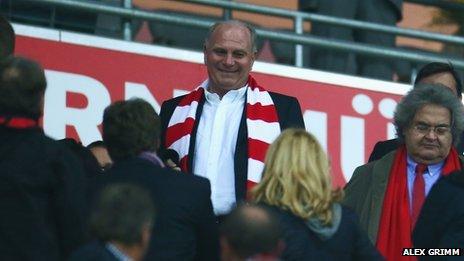German football star Uli Hoeness' own goal on tax
- Published

He was a star forward in the football team which won the World Cup in 1974 and off the field, he's been almost as influential, presiding over the relentless - and continuing - rise of Bayern Munich to greatness.
When Bayern thrashed the mighty Barcelona on Tuesday evening, Mr Hoeness sported his red supporter's scarf and gaudy scarlet jacket, the son of a butcher who rose to celebrity through his boots - and to riches by setting up a business making sausages.
But now he finds himself at the centre of a row over taxes. He admitted that he had a Swiss bank account: "Through my tax adviser I turned myself in to the tax authorities in January, 2013. It was in relation to a Swiss bank account of mine," he said. That has unleashed a volley of criticism as fierce as the goals he used to score.
Just as the (now former) French socialist tax minister Jerome Cahuzac ignited the debate about tax havens and off-shore arrangements for the wealthy in France, so Uli Hoeness has done the same in Germany.
Mr Cahuzac was the minister charged with maximising tax revenue. He had said: "I do not have, I have never had, an account abroad, not now, not ever," - until he said that he did have an account abroad. You can see the difficulty.
Uli Hoeness is not a politician. But he is a big public figure, and one who was big on probity: the sports star turned businessman turned chat-show guest with an opinion on everything - including business ethics.
From his position in a television studio, he opined: "You can't preach the virtues of water and then drink wine."
Subsequently, with the revelation of the Swiss account, Die Zeit wrote: "Hoeness always put great importance on morals. He would even frequently chat with Chancellor Angela Merkel."
Chancellor Merkel is unlikely to be talking much to him now. Her spokesman said: "Many people in Germany are now disappointed in Uli Hoeness. The Chancellor is among these people."
Less carrot, more stick
Her distance from her friend is understandable.
The German government in an election year has made much of its belief that if German taxpayers bail out the banks and governments of Cyprus, Ireland, Greece, Portugal and Spain, then everybody should pay their fair share.
But there has been a debate about how the unpaid taxes should best be retrieved. The German government reckoned that a softer approach would claw back more money.
The idea was to offer those with undeclared Swiss bank accounts the chance to come clean (albeit in private). If they did, they would pay back-tax but not be publicly shamed.
But the opposition balked at that. It said that those with hidden cash over the border should be pursued. It won, blocking the government's plan. A new agreement with Switzerland, offering softer terms, with more carrot and less stick, was abandoned.
It seems that Uli Hoeness had declared his account to the German authorities because he thought that the semi-amnesty was on the way, only to find, too late, that it was not.
He was then left as bereft as a solitary centre forward alone in his half of the field when the ball suddenly comes hurtling towards him.
Counting corporation tax
Germany isn't alone in wanting more taxes paid. In the UK, there have been rows over how big multinational companies like Starbucks, Amazon and Google arrange their affairs so that they pay tax in lower-tax-rate jurisdictions. Legal it is; pleasing to the cash-strapped British Treasury it is not.
Five European countries - France, the UK, Germany, Italy and Spain - have agreed to compel banks to disclose information so that tax authorities know where potential taxpayers have stuck their money. It is similar to the Foreign Account Tax Compliance Act (FATCA) in the United States which has been used against US tax evaders since 2010.
Governments are under pressure to crack down on tax evasion and avoidance by the rich for two reasons. Firstly, when economies grow robustly, tax revenues rise nicely. But when economies contract, governments cut spending so every penny of extra revenue mitigates the pain.
Secondly, the bailout and nationalisation of bankrupt banks by taxpayers may have stoked up resentment so that pre-Crash, getting away with paying less tax might have seemed like a misdemeanour, now it seems like a crime - or so runs the argument.
Maybe when capitalism was sailing along smoothly, few would have blinked an eye, but now that governments are cutting spending, including on social programmes for the poor, every penny counts - including those in foreign bank accounts.
Paying 'thieves'?
Or especially those in foreign bank accounts.
In this less sympathetic environment for those allergic to tax, the authorities in Germany have been pursuing a controversial tactic. They have been buying CDs of information from whistleblowers in Swiss banks.
Recently, the German state of Rhineland-Palatinate bought information on 10,000 accounts. It is thought it paid about four million euros ($5.2m; £3.4m) for the CD, but justified the payment by saying that the information would let it retrieve half a billion euros in unpaid taxes.
The Swiss government takes a dim view of this. It thinks this is payment to people who steal from banks in Switzerland, a payment for wrongdoing.
And it argues that a proper agreement on sharing information would have been better.
A Swiss finance ministry spokesman said: "Data CDs can yield chance finds at most. They do not clear the way for making sure everyone is taxed."
The atmosphere has changed. Uli Hoeness knows this. He may have shouted for joy at Bayern's stunning 4-0 victory over Barcelona.
But more complicated matters of tax may take the smile from his face. National heroes don't get much bigger than Uli Hoeness.